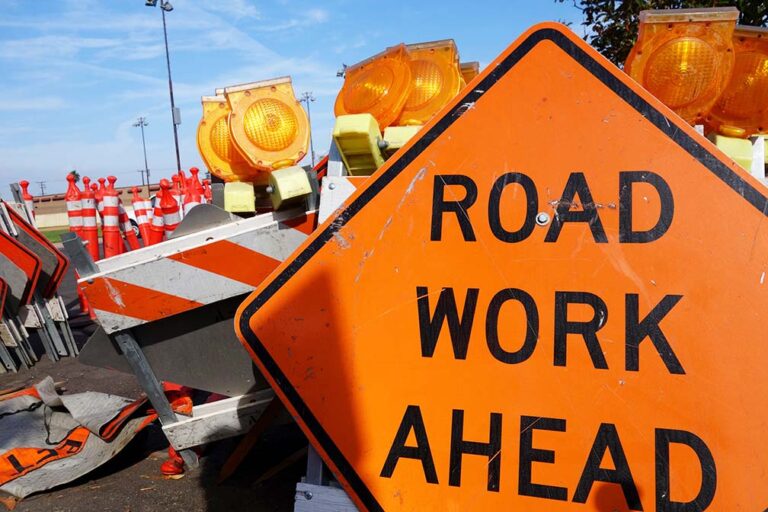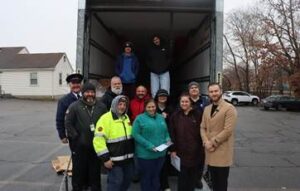WASHINGTON — The U.S. Department of Transportation’s Federal Highway Administration (FHWA) has awarded $34 million in grants to 10 projects in 10 states under the Advanced Digital Construction Management Systems (ADCMS) grant program in an effort to reduce highway construction delays and cost overruns.
According to a news release, the grants will help promote digital construction, such as computer modeling and 3D design.
The new program under the Bipartisan Infrastructure Law provides a total of $85 million over five years.
“The 10 projects selected for funding will help advance digital construction nationwide because they will serve as models for other state and local transportation agencies to adopt these best practices,” said Federal Highway Administrator Shailen Bhatt. “With funding from President Biden’s Bipartisan Infrastructure Law, these technologies will help us more quickly deliver the transportation system of the 21st century.”
The ADCMS program is one aspect of FHWA’s multifaceted Technology and Innovation Deployment Program and provides funding as an incentive for state departments of transportation. It promotes access to more meaningful, accurate, and easy-to-use data by construction professionals with enhanced software modeling tools and features. Better and more consistent modeling allows the seamless sharing of design and construction plans.
The program goals include:
- Accelerated adoption of advanced digital construction management systems throughout the project lifecycle to boost productivity and manage complex projects.
- More timely and productive information-sharing through reduced reliance on paper.
- The development and deployment of best practices on construction sites.
- Increased technology adoption and deployment by states and local governments.
- Increased transparency as the result of the real-time sharing of information.
The projects focus on information-sharing, reduced reliance on paper and increased productivity and cost savings during project delivery with the goal of serving as models for the adoption and deployment of digital construction technologies on a national scale.
Project Selections for Fiscal Years 2022 and 2023:
California DOT — $3,920,800
Caltrans will use the funding to facilitate better data management across the state’s project delivery cycle using a model successfully deployed by the United Kingdom National Highways Bureau. The project will reduce the need for paperwork and streamline processes.
Connecticut DOT — $4,497,696
Connecticut transportation officials will use the funding to update the existing, cloud-based project delivery and document management system. These enhancements will eliminate the use of paper and move toward 3D models for work orders, logs, reports and correspondence while laying the foundation for improved digital management of future construction projects. The upgrades also will facilitate sharing of real-time information with federal, state agencies as well as contractors and others, minimizing delays and cost overruns.
Delaware DOT — $4 million
Delaware transportation officials plan to use the funding to automate data collection processes that would reduce time spent on labor-intensive and routine activities at worksites while freeing up time for higher-skilled work. By harnessing accurate, real-time data about construction projects, agency inspections and quality control measures, these enhancements also would reduce workers’ exposure to hazardous worksite conditions and improve the safety of employees and the public traveling through work zones. DelDOT also plans to partner with the private sector in this effort.
Illinois DOT — $4,500,000
Illinois transportation officials will use the funding to establish a digital information-sharing network for future construction operations. This network would reduce the use of paper reports, provide greater efficiency of real-time data collection, allow 3D modeling and digital aerial surveys to improve accuracy and promote the use of information-sharing through cloud storage. Other benefits include reducing worker exposure to on-site surveys in hazardous work zones and environmentally sensitive areas and the ability to share data with local governments, state agencies and other organizations in the state.
Iowa DOT — $1,501,200
Iowa transportation officials will use the funds to improve digital construction standards and processes to capture, share and store information about state-owned utilities, bridges and pavement materials. In addition, project funds will help to streamline asset management by allowing easy access to data from digital models for use in preparing bids, achieve better project outcomes and reduce reliance on paper. When fully implemented, electronic information should help state officials make construction projects more efficient thereby reducing exposure for workers in work zones to live traffic, inattentive drivers and impaired drivers.
Minnesota DOT — $2,160,000
Minnesota transportation officials will use the funds to update asset and digital data management systems across the state’s construction cycle with the goal of improving decision-making, managing risks and employing mitigation strategies. Project funds will fill critical needs for hardware, software and workforce training, allowing easier access to information about preliminary designs and construction plans, more safeguards and quality assurance.
Oklahoma DOT — $3,079,440
Oklahoma transportation officials will use the funding to develop and implement a digital project delivery plan for managing assets, streamlining data storage, and tracking progress throughout construction, including the maintenance and operations phases. Other enhancements include using GPS equipment and 3D models to make data collection faster and more efficient, including purchasing equipment for construction inspections, and training for construction and design staff.
Pennsylvania DOT — $3,910,000
Pennsylvania plans to use its funding to develop an open data standard that would eliminate the need for paper plans and make it easier to exchange information digitally between design and construction teams. Training for PennDOT personnel and contractors would ensure that transportation officials and those in related industries develop knowledge and skills on advanced technology and cutting-edge computer systems together.
Utah DOT — $5 million
Utah transportation officials will use the funding to improve digital data collection tools in the field and training for its design personnel and project reviewers to use them for construction projects as early as 2024-2025. By expanding GIS and CMaps tools, Utah transportation officials will be able to streamline inspections in the field and provide predictable reports and assessments.
Washington State DOT — $1,350,000
Washington State transportation officials will use the funding to create automated processes aimed at collecting traffic control information for roadway signs at intersections and ADA curb ramps. These upgrades will eliminate the need for workers to be in hazardous traffic conditions for data collection purposes. It also will save time by reducing the need for paper reports and allow input of electronic data into 3D models to get to the public and other stakeholders faster.
Born in Pine Bluff, Arkansas, and raised in East Texas, John Worthen returned to his home state to attend college in 1998 and decided to make his life in The Natural State. Worthen is a 20-year veteran of the journalism industry and has covered just about every topic there is. He has a passion for writing and telling stories. He has worked as a beat reporter and bureau chief for a statewide newspaper and as managing editor of a regional newspaper in Arkansas. Additionally, Worthen has been a prolific freelance journalist for two decades, and has been published in several travel magazines and on travel websites.















